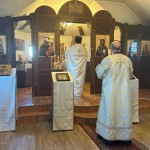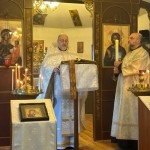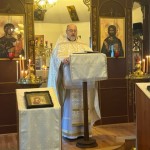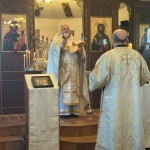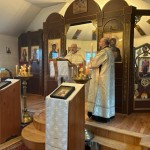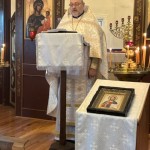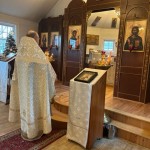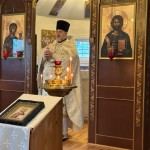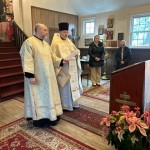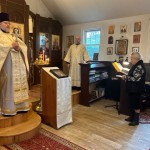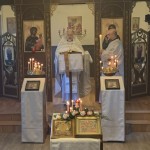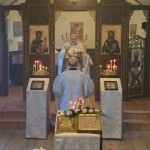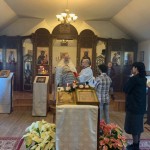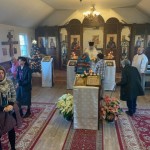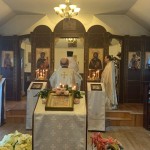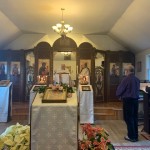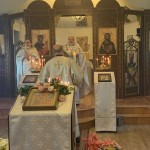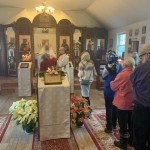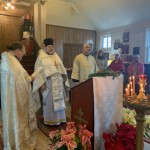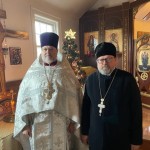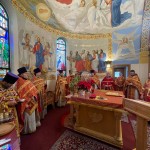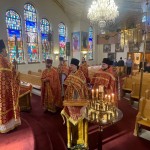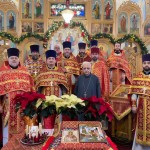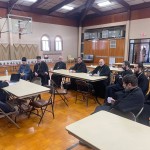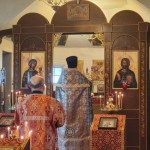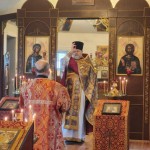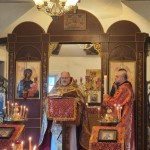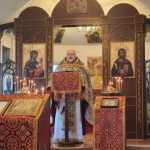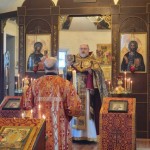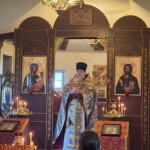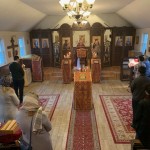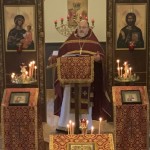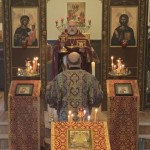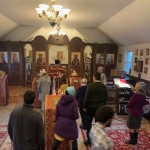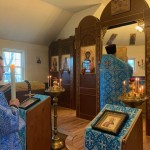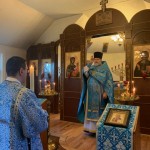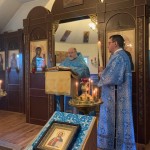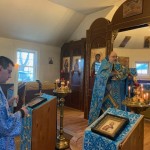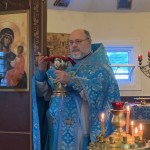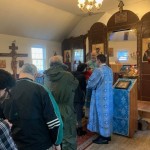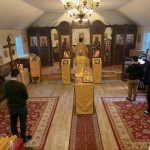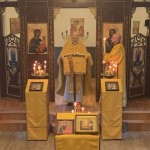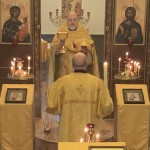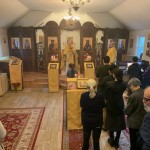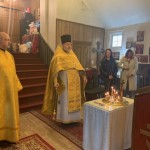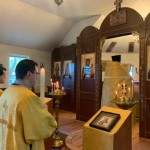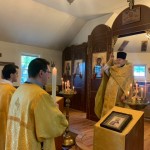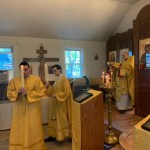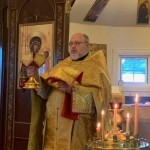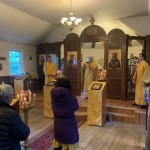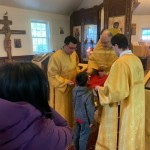On January 15, on the Sunday before the Theophany, Rector of St. George Church, Archpriest Igor Tarasov served the Divine Liturgy in our temple. After the Gospel lesson he preached the following homily:
“Dear brothers and sisters in Christ! On this Sunday before the feast of the Baptism of the Lord we hear the reading from the first chapter of the Gospel of Mark. And we just heard of the preparation for the appearance of the Lord to the world. That preparation was made by God sending His Prophet, John the Baptist. We call him the Forerunner meaning that he was running before Christ; he was a predecessor of Christ. He ran before to prepare the ways of the Lord”.
“That Gospel story spiritually instructs us that we have to prepare the ways of the Lord in our own lives. St. John the Forerunner specifically called the people for the preparation for the coming of the Savior. He called them saying, “Prepare the ways of the Lord; make His paths straight” (Mk. 1, 3). Therefore, we have to participate in that preparation”.
“Let us take an example. When we are preparing for the Holy Communion, we have to repent, to ask the Lord to make us worthy to receive His Body and Blood. We have pray that the Lord may unite with our human essence, that He may sanctify and cleanse us. We need to practice prayer, fasting and repentance to prepare for our union with the Lord. Preparation is important”.
“We often complain that we do not feel God’s help in our life, in our deeds. Today’s Gospel lesson should open our eyes and help us see our spiritual state. If we wish God to be present in our lives, to help us; if we desire that the divine grace may shine in our souls; if we wish that the blessing of God was upon us – we need to prepare ourselves. We have to undertake spiritual labor. St. John the Baptist called to such a labor when he said, “Repent, for the Kingdom of Heaven is at hand” (Mt. 3, 2)”.
“Today we commemorate Venerable Father Seraphim of Sarov. He lived 3 centuries ago. Most of his life was spent in spiritual labor. He was praying a lot, he had an endeavor of staying on a rock for a long time. In such a way St. Seraphim was preparing his soul for the Lord. Could he complain that God is not with him? He could but he probably never did. Could he feel that God is not helping him? Maybe. But he endured and persisted in his spiritual labor. Therefore, St. Seraphim deserved a great devotion among the Orthodox people and became one of the Lord’s elected ones in the Heavenly Kingdom. He believed that the Kingdom of Heaven is at hand, as the Gospel says, so he acted to prepare for it”.
“And for us, dear brothers and sisters, spiritual labor may not be so intense as it was in the life of St. Seraphim. For us would be sufficient to realize how sinful we are and to repent the way it was done by the people who were coming to St. John the Baptist. He plunged them into the waters of Jordan, and that meant washing away their sins. But he told them, “I indeed baptized you with water, but He will baptize you with the Holy Spirit” (Mk. 1, 8)”.
“Dear brothers and sisters! We have the Savior, our Lord Jesus Christ who through the Holy Church grants us abundant and various gifts of the Holy Spirit. And in order to be spiritually comforted by God’s blessings and His help, we need to undertake spiritual labor, to prepare ourselves, our hearts, our souls to be always united with the Lord”.
“The two feasts, Nativity and Theophany, being united, make a joyful winter holiday season. In the ancient Church those two feasts were celebrated together, on one day, in order to honor the great work of the Incarnation of the Son of God and the coming of the Savior into this world. We, nowadays having two separate feasts, should remember about their spiritual connection. On the Nativity, when our Lord was about to be born into the world, the Holy Family came to Bethlehem but could not find any place to stay. Human dwellings shut their doors for the Blessed Mother and St. Joseph. This was because the human souls were also closed for the Son of God coming into the world. Let us not repeat what those people did in those times. Through the lips of St. John the Baptist the Church calls us to open our hearts to the Lord, to prepare ourselves for His coming and to prepare ourselves to follow Him. Let us open our souls to follow Him, so that we may enter His Heavenly Kingdom, the Kingdom He brought to us, so “whoever believes in Him may not perish but may have eternal life” (Jn. 3, 16)”.
The choir nicely performed various hymns of the holy day season during preparation for Holy Communion.
After the dismissal of the Liturgy the Rector made announcements regarding the approaching feast of the Theophany.
Following the services the Rector and parishioners enjoyed a delicious luncheon held in honor of Fr. Igor’s past birthday. A toast to our Rector was raised by our Warden, Olga Roussanow.

